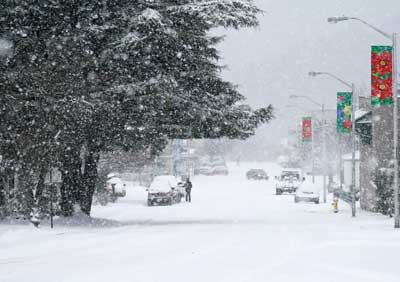Twenty yards of sand. Thirty-five 5-gallon pails of “snow melt”.Just 15 hours of overtime.
Add it all together, as town Administrator King Fitch routinely does, and Friday Habor’s account for road maintenance emerged from the first true snow and ice storm of the season relatively unscathed.
The durability of its water system proved even more stout.
“It really was kind of a ‘friendly’ cold snap from a water perspective,” Fitch said. “Typically when the thaw comes that’s when pipes burst.”
At the headquarters of San Juan County’s Public Works Department, Operations Manager Russ Harvey has yet to tally the final cost of last week’s snow and ice response. The cost of cleanup and of resupplying its stockpile of sand and salt has yet to be added into the equation, Harvey said.
However, he said the department got the upper hand on keeping the primary roads passable in fairly short order.
“We were able to get to the side roads quicker than we used to,” Harvey said. “By Wednesday afternoon we were plowing the side roads and by Friday we basically had all the county roads cleared.”
Public Works is responsible for maintaining roughly 265 miles of roadway — a mix of seal-coat, gravel and asphalt — on the four ferry served islands, combined. Road crews on Orcas were first to respond, as snow began falling on the east side of the island early Saturday.
The department dumped 800 tons of sand and 40 tons of salt on roadways, countywide, over the course of the 6-day winter storm. Its crews clocked 135 hours of overtime during the 3-day holiday weekend, and 86 hours of overtime after that.
Harvey credits earlier investment in “hook-lift” trucks for the department’s improved ability in keeping roads clear. Plows, sanders and sweepers, or various attachments, can be easily added or removed, either on the front or rear, given the situation.
“They can go from a dump truck to a sander in about 15 minutes,” Harvey said. “We’re tickled with them. You could call them a ‘multi-tasker’.”
Despite an improved ability to remove snow and ice, Harvey noted it can prove a labor intensive campaign and the department sets aside only a modest amount of its overall budget for emergency winter maintenance.
Prolonged bouts of snow or ice may be memorable, but, Harvey notes, they are infrequent in the islands.
“It’s a crap shoot how you go about planning for it,” he said. “There are year’s when you get a late hit and that’s generally when you don’t have it. That’s why it’s important to have a reserve.”
Fitch and Harvey agree that the rapid disappearance of last week’s snow and ice is both unusual and beneficial to the bottom line. It disappeared, literally, overnight.
“If I were to write a script that would be the kind of thaw I would want,” Harvey said.




